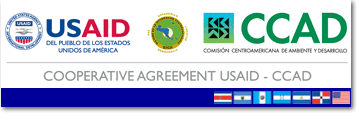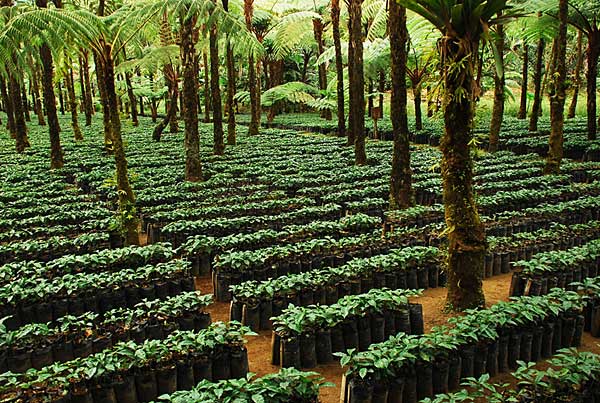
| ¿Qué Hay de Nuevo? | |
| ¿Qué Pasa? | |
|
||
Despite Economy Rainforest Alliance Continues to See Growth in Programs
As part of the Rainforest Alliance's efforts to conserve ecosystems and protect the rights and welfare of workers, their families and communities, the nonprofit helps companies transform the way they conduct business. During 2009, the organization saw continued growth in the number of companies buying from Rainforest Alliance CertifiedTM farms or forests -- an increase of 26 percent from the previous year. "We are improving entire industries," said Tensie Whelan, president of the Rainforest Alliance. "Four out of the five top tea companies worldwide have committed to buying tea from Rainforest Alliance Certified farms, and currently one out of every three cups of tea consumed in the UK contains leaves from Rainforest Alliance Certified tea plantations." In forestry, the Rainforest Alliance's SmartWood program is a leading certifier to Forest Stewardship Council (FSC) standards, having certified 50 percent of FSC-certified lands worldwide. The FSC is considered the gold standard of well-managed forest certification, recognized by the world's leading environmental organizations. FSC-certified forests provide habitat for wildlife, sequester carbon, conserve biodiversity, protect soil and waterways, consider community well-being, improve worker safety and training, and provide economic opportunity and stability in a down economy. During 2009, the Rainforest Alliance's SmartWood program certified 22.2 million acres (9 million ha) of forestland, increasing the program's overall forest management area 18 percent to 145 million acres (59 million ha) worldwide. The program also certified the first biomass pellet mill in the US to FSC standards, a first step to ensuring that efforts to promote energy independence and reduce greenhouse gas emissions are not compromised by destructive impacts that can result from overharvesting wood. There was a similar increase in the number of companies certified along the supply chain, through FSC Chain-of-Custody certification, a practice that ensures the traceability of an FSC-certified wood or paper product from the forest to the storefront. FSC Chain-of-Custody certificates issued during 2009 grew 18.3 percent from the previous year to 2,783 certificates. In 2009, companies like Staples, Marks & Spencer, Unilever and Century Furniture ramped up their sourcing of FSC-certified goods. Growth in the number of the U.S. Green Building Council's LEED-certified buildings - promoting energy efficiency, environmental design aspects and use of FSC-certified wood in their rating systems -- is evidence of growing recognition by companies and consumers of the importance of sustainability. From the United States to China, the Rainforest Alliance's Training, Extension, Enterprises and Sourcing (TREES) program is at work helping small and medium enterprises to sustainably harvest and manufacture forest products, and market these goods to responsible businesses and consumers around the world. The TREES program operates in 13 countries around the world with recently awarded grants and contracts for Ghana, Cameroon, Ecuador and Panama and expansion into facilitation of forest carbon pilot projects in Guatemala, Honduras, Ghana and Mexico. The Rainforest Alliance takes a holistic approach to its work in sustainable agriculture, but focuses its efforts in areas of high biodiversity, such as the tropics. Farms that meet rigorous environmental, social and economic standards for sustainability can earn Rainforest Alliance certification. The organization has brought over 1.2 million acres (501,471 ha) of farmland into sustainable production. Rainforest Alliance Certified farms protect waterways, curb deforestation, improve efficiency, ensure decent wages and housing for farm workers, improve worker safety, provide access to education for farm children, limit pesticide use and use less water. During 2009, the first large-scale group certification was awarded to over 12,000 smallholder tea farmers in Kenya and an addendum to the Sustainable Agriculture Standard, the standard used to audit for certification, was published for palm oil, soybean and sugar cane crops. The volume of Rainforest Alliance Certified coffee sold in 2009 grew 41 percent from the previous year to 87,583 metric tons. Rainforest Alliance Certified coffee currently accounts for an estimated 1.5 percent of coffee sold on the international export market, and roughly fifteen percent of bananas on the international market come from Rainforest Alliance Certified farms. With public commitments from Kraft; Mars, Incorporated; Blommer and several other collaborations with major cocoa traders and processors, the estimated sales of Rainforest Alliance Certified cocoa increased 27 percent from 6,700 tons to 8,500 tons, helping thousands of cocoa farmers in Ghana, Côte d'Ivoire, Ecuador and elsewhere raise their standard of living while conserving the trees, streams and soils on which they and future generations depend. Mars has made an industry changing commitment to source all their cocoa sustainably by 2020 including 100,000 tons of cocoa from Rainforest Alliance Certified farms. The Galaxy chocolate bar has already launched in the UK with the green frog seal. During the last year, the number of companies buying from Rainforest Alliance Certified farms and using the seal on packaging increased by 40 percent to nearly 2,000 companies. PG tips now sources 100 percent of their tea from Rainforest Alliance Certified tea estates after working with the Rainforest Alliance on their supply chain over the past several years. "Though many of the world's largest companies have signed on to buy from Rainforest Alliance Certified farms or FSC-certified forests, we have also seen tremendous growth and support from smaller businesses that are using the seal," said Whelan. For its work in tourism, the Rainforest Alliance received a 2009 Travel + Leisure Global Vision Award for upping the ante for sustainability standards in the tourism industry. The Rainforest Alliance was cited for the leadership role it has played in creating the Tourism Sustainability Council, a global membership body set to launch early next year. The council will promote widespread understanding of sustainable tourism principles and help travelers differentiate the truly eco-friendly from the greenwashers. Currently 507 tourism businesses are working with the Rainforest Alliance's sustainable tourism program, up 18 percent from 429 businesses in April 2008. The climate initiative has also seen an upsurge in activity, to date validating or verifying 11 forest carbon projects representing 1,897,239 acres (768,113 ha). Together with partners like IMAFLORA, the Rainforest Alliance evaluates projects against standards including the Climate, Community & Biodiversity Alliance, the Voluntary Carbon Standard and Plan Vivo. Recent accomplishments include the first validation of a community forest restoration project to the updated Plan Vivo Standards in Africa and the assessment of a new methodology used to reduce emissions from carbon-rich peatlands. The Rainforest Alliance has more than 20 additional carbon projects currently in progress in over 20 countries. The Rainforest Alliance also caught the eye of several high-profile celebrities in the last year. The 2009 Rainforest Alliance Gala received widespread recognition with honorable chair Gisele Bündchen in attendance, and Martha Stewart acknowledged the organization's work on her Earth Day show. To set the tone for another successful year in 2010, U.S. Secretary of State Hillary Clinton recently lauded the Rainforest Alliance's efforts to bring micro-enterprises into global supply chains, stating that it was a "critical element of sustainable and inclusive development." The Rainforest Alliance works with people whose livelihoods depend on the land, helping them transform the way they grow food, harvest wood and host travelers. From large multinational corporations to small, community-based cooperatives, businesses and consumers worldwide are involved in the Rainforest Alliance's efforts to bring responsibly produced goods and services to a global marketplace where the demand for sustainability is growing steadily. For more information, visit www.rainforest-alliance.org. Picture: Charlie Watson, Rainforest Alliance
|
||


